Is alcohol still used for free DNA extraction? Jian Shi Biology's alcohol-free extraction method is here!
Published Time:
2024-11-12
cfDNA stands for "cell-free DNA," a special type of DNA found in the blood. It originates from cells that die or lyse, releasing their DNA into the bloodstream. These DNA fragments exist freely in the blood, not bound to cell nuclei or extracellular vesicles. cfDNA contains DNA fragments from both normal and tumor cells, making it widely used in research and clinical applications for cancer diagnosis, monitoring, and treatment. Analyzing cfDNA in blood provides information about tumors, such as their presence, quantity, and mutations, which is important for early cancer diagnosis, treatment response evaluation, and monitoring disease recurrence.
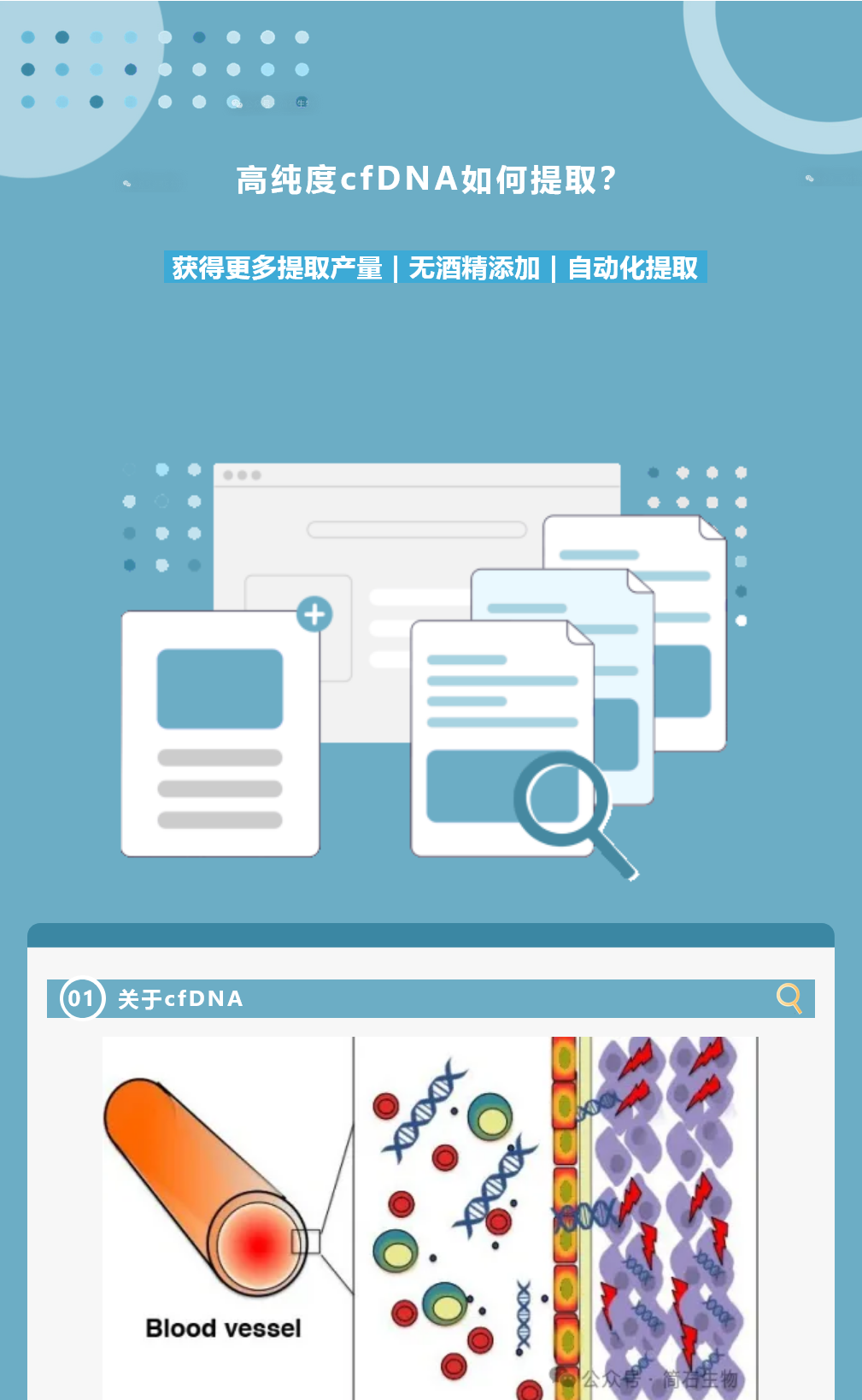
What is cfDNA? -----------------------------------------------------------------------------------------------------------------
cfDNA stands for "cell-free DNA," a unique type of DNA found in blood. It originates from cells that have died or lysed, releasing their DNA into the bloodstream. These DNA fragments exist freely in the blood, not bound to cell nuclei or extracellular vesicles. cfDNA contains DNA fragments from both normal and tumor cells, making it widely used in cancer diagnosis, monitoring, and treatment research and clinical applications. Analyzing cfDNA in blood can provide information about tumors, such as their presence, quantity, and mutations, which is significantly important for early cancer diagnosis, treatment efficacy evaluation, and monitoring disease recurrence.
Development of cfDNA -----------------------------------------------------------------------------------------------------------------
Early Discoveries: In 1953, researchers first discovered free-floating DNA in the blood. The origin and significance of these DNA fragments did not attract widespread interest from researchers at the time.
Research on DNA in Blood: As the importance of DNA in genetics and biology became increasingly recognized, researchers began to study DNA in blood more deeply. They discovered that, in addition to cell death, DNA in blood could also come from sources such as tumor cells.
Technological Advancements: With the development of biotechnology, especially the widespread application of PCR (Polymerase Chain Reaction) and high-throughput sequencing technologies, researchers could more accurately detect and analyze cfDNA in blood, deepening their understanding and application of it.
Applications in Cancer Research: In recent years, the application of cfDNA in cancer research has become increasingly prominent. Researchers have found that tumor cell-released cfDNA can carry tumor-related mutations and abnormal genes, thus serving as a non-invasive biomarker for early cancer diagnosis, treatment monitoring, and prognosis evaluation.
Research in Other Fields: Besides cancer research, cfDNA has been widely applied in many other fields, such as prenatal screening, organ transplant monitoring, and infectious disease diagnosis.
In summary, the history of cfDNA research can be traced back to early discoveries in the 1950s, but only recently, with advancements in biotechnology and in-depth research on diseases like cancer, has cfDNA received widespread attention and study.

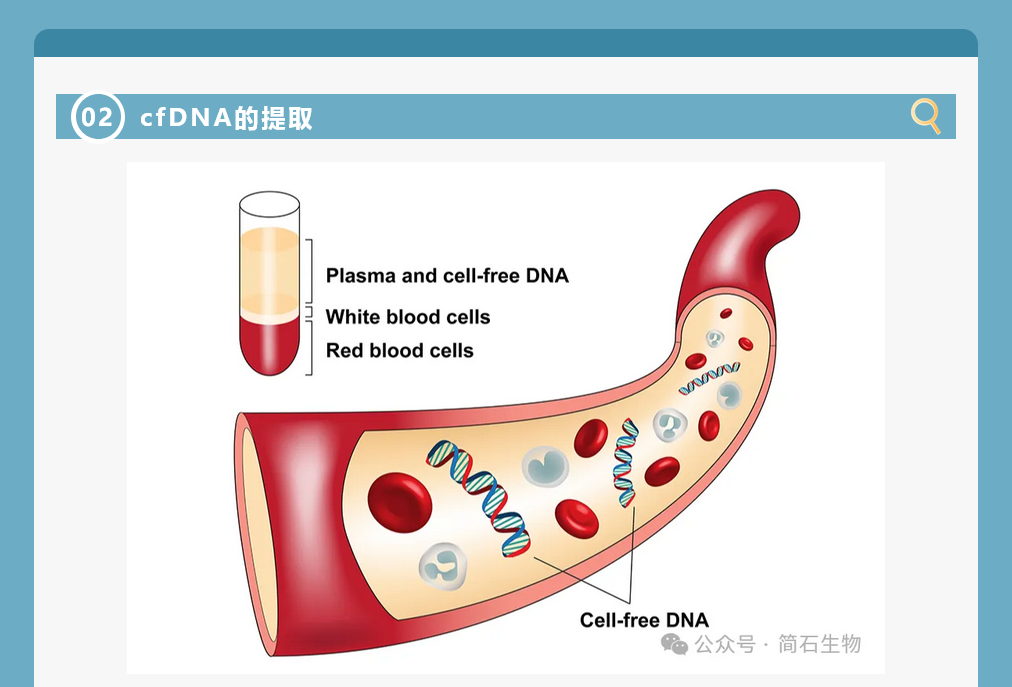
Common Difficulties in cfDNA Extraction ---------------------------------------------------------------------------------------------------------
cfDNA extraction may encounter several difficulties that can affect extraction efficiency and quality. Here are some common difficulties and their potential causes:
Low-Volume Samples: When the blood volume in a sample is low, the amount of cfDNA extracted may be insufficient. This could be due to inadequate sampling, improper blood storage, or insufficient cfDNA release from the blood.
Contamination: Contaminants from the external environment may interfere with the cfDNA extraction process. For instance, DNA present in DNA extraction kits, experimental instruments, or the laboratory work environment may mix with the cfDNA in the sample, reducing the purity of the extraction.
Improper Sample Preprocessing: The sample preprocessing process may affect cfDNA extraction efficiency. For example, failure to adequately mix and dissolve the blood sample or the use of inappropriate storage conditions may affect cfDNA extraction.
DNA Degradation: During extraction, if the sample is improperly stored or handled, or if the extraction process takes too long, cfDNA degradation may occur, reducing extraction efficiency and quality.
PCR Inhibition: If PCR inhibitors, such as salts and proteins, are present during extraction, they may affect the results of subsequent PCR analysis, thus impacting cfDNA extraction. Follow Jian Shi Biology for the latest updates, including professional interpretations that provide a deeper understanding of the information behind the biological data.
How can efficient cfDNA extraction be achieved? ----------------------------------------------------------------------------------------
Jian Shi Biology Serum/Plasma Cell-Free DNA Extraction Kit (Magnetic Bead Method) This extraction technology can extract high-purity cell-free DNA from less than 10 ml of serum/plasma, and less than 1 ml of amniotic fluid or cerebrospinal fluid. Whether it's blood samples, amniotic fluid, or cerebrospinal fluid, we can effectively extract high-quality DNA. The resulting DNA yield is sufficient and of high purity, fully meeting the needs of various molecular biology experiments, including PCR, quantitative PCR, biochip analysis, and next-generation sequencing. These characteristics make our extraction technology the preferred choice for researchers and laboratories, providing a reliable foundation and support for scientific research and clinical diagnosis.
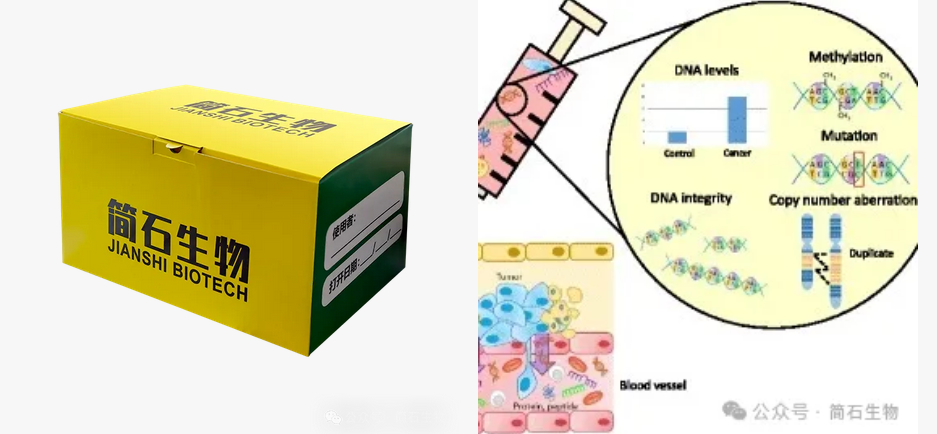
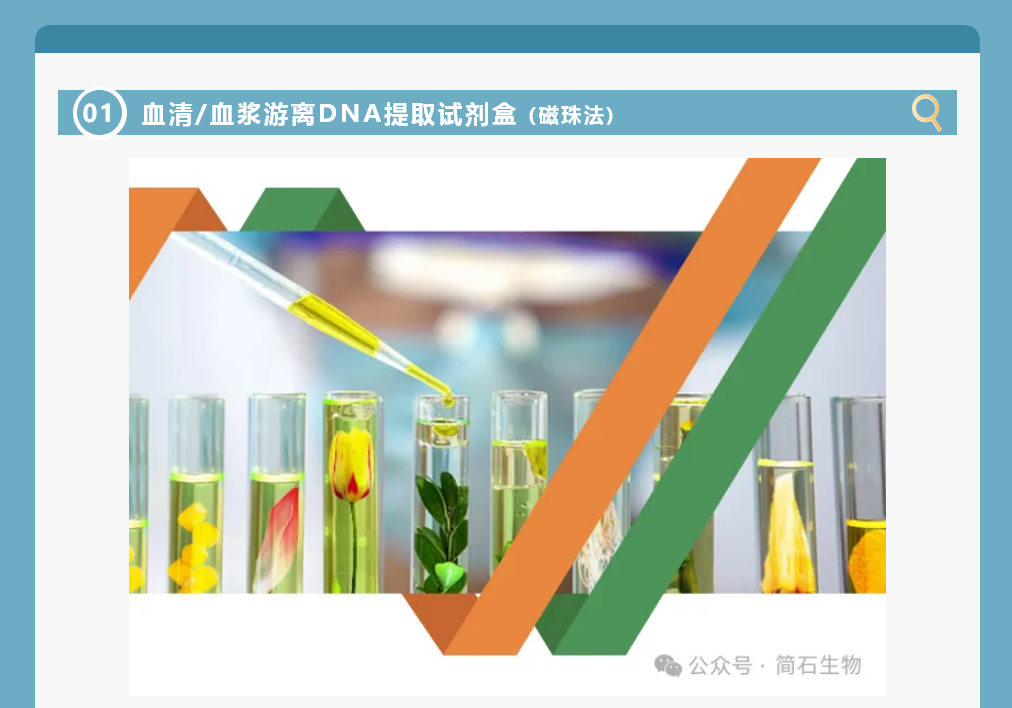
Product Advantages ------------------------------------------------------------------------------------------------------------------------
No need to add absolute ethanol
No ethanol addition, will not affect downstream applications.
Flexible sample processing capacity
Sample types compatible with serum/plasma (≤10ml), amniotic fluid and cerebrospinal fluid (≤1ml).
Minimum elution volume of only 15µl
Minimum elution volume of 15μl, effectively increasing the concentration of extracted nucleic acids.
High DNA yield and good purity obtained
Can be directly used for restriction enzyme digestion, PCR, high-throughput sequencing and other molecular biology experiments.
Product Information ------------------------------------------------------------------------------------------------------------------------
Notes:
1. At low environmental temperatures, cfDNA digestion solution or cfDNA binding solution may precipitate. A 37℃ water bath for a few minutes can help re-dissolve it. After it becomes clear and transparent again, cool it to room temperature before use.
2. Proteinase K and its preservation solution can be transported at room temperature.

Product Performance ------------------------------------------------------------------------------------------------------------------------
1. Achieves the highest cfDNA yield.
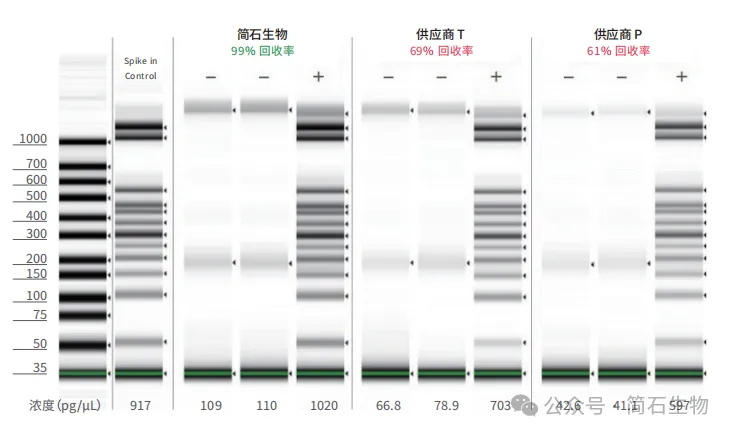
2. Linear correlation
※ Free DNA extraction with three different input volumes.
※ Input amount is linearly correlated with recovery rate.

3. Simple Workflow
※ The entire extraction process can be completed manually.
※ Compatible with mainstream "open" automation platforms for automated extraction.
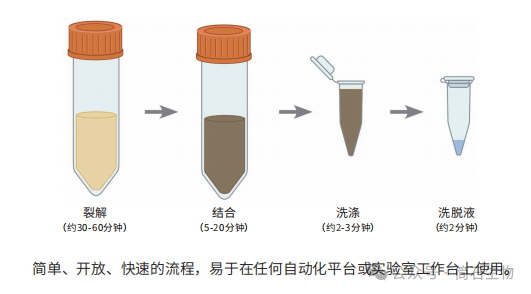
4. Broad Sample Compatibility
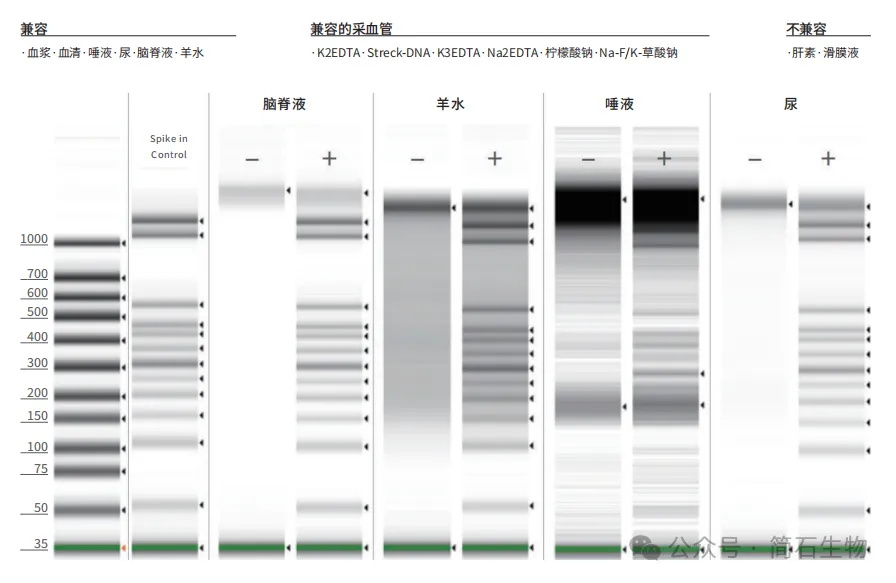

Related News

Order Consultation: Hu Manager


Order Consultation: An Manager


End-user Scientific Research Customer Order Consultation


Technical Consultation: Bai Technical


Customer Service


Douyin


WeChat Video Account


Kuaishou

Contact Us
Jianshi Biotechnology (Beijing) Co., Ltd.
Company Address: Room 401, Building 11, No. 12 Courtyard, Juyuan Middle Road, Mapo Town, Shunyi District, Beijing
Phone: 86 010-58235289
E-mail: mzhao@jianshibio.com
Jianshi Biotechnology (Zhejiang) Co., Ltd.
Address: Building 11, No. 36 Xingshun Road, Zhongyi Ningbo Eco-park, Yuyao City, Zhejiang Province
Phone: 86 18611610761
Leave a Message
If you are interested in our products, please leave your phone number.
Consult Now →Product Subscription
Subscribe to us to stay informed about product updates and special offers

